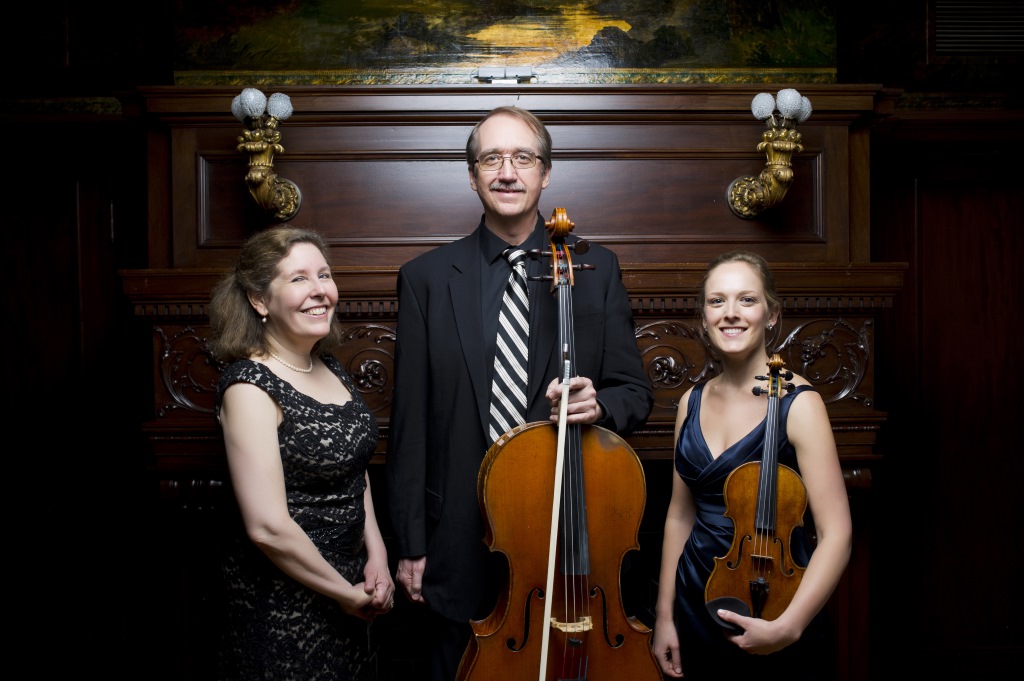Prometheus Trio Plays “Hardest Program Ever”?
Tough music handled with technical dispatch, but it needed a little more spirit and fun.
The Prometheus Trio’s concert at Wisconsin Conservatory of Music on April 22-23 was a triumph of programming. They structured the evening so that we’d hear every possible duo combination of the ensemble before a full reunion at the end, and they chose great music with which to do it. Also hard music. I knew this going in, but no one was more aware of these challenges than the players. Pianist Stefanie Jacob had posted on Facebook the morning of April 22: “Prometheus tonight…hardest program ever…” The excellent program notes, written by members of the trio, echoed the sentiments about difficulty.
And yet, at 7:30 p.m., come what may, the quiet opening piano tremolos of Franz Schubert’s Fantasie for Violin and Piano, D. 934, floated into the Conservatory hall. In this intimate introduction, I heard more rubato than I was used to, but I have to say I liked it. The first real test in this piece was the fast, Hungarian-tinged section that followed. Violinist Margot Schwartz dispatched the technical hurdles as they came, though without much spark. Both players, Schwartz and Jacob, looked very determined and in the zone. The sound was well balanced, bringing clarity to the textures.
Next came the daunting theme-and-variations section. Schwartz sounded quite fine in her first statement of the lyrical theme, and as I watched her during the variations I noticed how often Schubert’s gestures covered a huge range of the violin in a short timeframe. It looked physically demanding and precarious. Much of the variation set was head-down, in-the-zone execution of notes, and the players missed some opportunities for more lightness and humor. At the end of all the action, the music gently settled back into the quiet mood of the opening. Something about returning to that magical place, aware of the audience’s shared experience of time passing, was really cool. The ensuing finale came off well, and Jacob knocked off an absolutely flawless double octave run in the coda.
[inarticlead[Next was Bohuslav Martinů’s Cello Sonata No. 2, a dark and intense piece of literature from the mid-twentieth century. Cellist Scott Tisdel had a different onstage persona than Schwartz: relaxed rather than determined. His tone was beautiful in every register, but I wanted to hear more bite and aggression in this music. Jacob was great in Martinů’s passages of fingerwork, but the opening piano solo and other chordal moments in the first movement lacked direction. Nevertheless, Martinů’s appealingly spicy harmonic language shone through. The final minute or so of the first movement was truly exciting chamber music, with Martinů leading us into a dark tunnel with flashing lights. In the second movement, I enjoyed Jacob’s brooding opening solo. Each chord glowed, and each attack was appropriately calm, letting us cool down. Tisdel had a great singing tone, and in the final moments of this movement the players were totally in sync. For the third movement, some of the music just didn’t pop the way it needed to. A cool dancelike moment for the piano could have been more special, and the climactic cello cadenza was undercooked. Overall, this piece needed more intensity and a better navigation of Martinů’s irregular phrases.
Jacob got a much-needed break going into the second half, as Schwartz and Tisdel played Maurice Ravel’s Sonata for Violin and Cello. What came across in this performance was the entering and exiting of different characters, achieved by Ravel’s clever scoring, and also the independence of the characters, to the point that I was even reminded of Elliott Carter’s string quartets. Mr. Tisdel brought a wonderful sensitive touch to all the register changes, and to many passages of string harmonics. In the second and third movements, I heard a lot of juicy, deeply felt playing from both musicians. Ms. Schwartz dug in to some of the darker landscapes, with Mr. Tisdel providing good support. I enjoyed their attention to Ravel’s more ethereal textures as well as the extroverted moments.
The trio reunited to play Paul Schoenfield’s Café Music, a piece I was hearing for the first time. It was a heck of a lot of fun. Ms. Jacobs smiled a lot during the first movement, reveling in the piano licks. Like any good contemporary piece that explores an older form, this one gradually started to stretch the boundaries of “café music”, both in musical content and technical demands, and the happy mood lapsed into more anxiety. Balance-wise, the piano was a little too present in the mix at times. The haunting second movement oozed with nostalgia. Schoenfield’s program note had stated that the piece “could be played at a restaurant, but might also (just barely) find its way into a concert hall”; I would flip this assessment. If you played this music at a restaurant, the customers might get lost in thought about past loves or maybe order too many martinis. Jacob dug into the finale’s ragtime constructions with gusto; I would love to hear her play some of William Bolcom’s zanier rags! The rhythms of the ensemble sparkled, and the coda was delightfully wild. Café Music received the biggest applause of the night, perhaps because of how much fun the group seemed to be having.
After Jacob addressed the audience to say “This program was extra strenuous for all of us,” the trio played a pitch-perfect encore: one of Enrique Granados’ Spanish dances. It provided a perfect foil to Café Music. This was real café music, not trying to be anything but itself. It was lovely.
I left the hall thinking about my experience with the Schubert and Martinů, two of my favorite chamber pieces. I was grateful to have heard them live, and I admired the performers’ hard work. Admittedly it’s a lot to ask to master difficult music and take it to the next level of understanding and care, but I wanted to turn up the heat on that Promethean fire of enlightenment.
Review
-
Ouzo Café Is Classic Greek Fare
 May 23rd, 2024 by Cari Taylor-Carlson
May 23rd, 2024 by Cari Taylor-Carlson
-
‘The Treasurer’ a Darkly Funny Family Play
 Apr 29th, 2024 by Dominique Paul Noth
Apr 29th, 2024 by Dominique Paul Noth
-
Anmol Is All About the Spices
 Apr 28th, 2024 by Cari Taylor-Carlson
Apr 28th, 2024 by Cari Taylor-Carlson





















